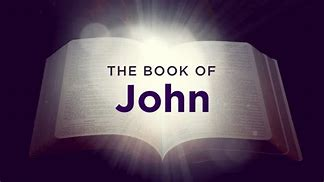Jesus Heals an Official’s Son - {Interlinear <Greek>}
4:46 - So {οὖν<oun>} he → came {Ἦλθεν<erchomai>} again {πάλιν<pal>} into {εἰς<eis>} Cana {τὴν Κανᾶ<ho Kana>} in → Galilee, {τῆς Γαλιλαίας,<ho Galilaia>} where {ὅπου<hopou>} he → had → made {ἐποίησεν<poieō>} the {τὸ<ho>} water {ὕδωρ<hydōr>} wine. {οἶνον.<oinos>} And {καὶ<kai>} at {ἐν<en>} Capernaum {Καφαρναούμ.<Kapharnaoum>} there → was {ἦν<eimi>} an {τις<tis>} official {βασιλικὸς>basilikos>} whose {οὗ<hos>} son {ὁ υἱὸς<ho huios>} was → ill. {ἠσθένει<astheneō>}
4:47 - When → this {οὗτος<houtos>} man ← heard {ἀκούσας<akouō>} that {ὅτι <hoti>} Jesus {Ἰησοῦς<Iēsous>} had → come {ἥκει<hēkō>} from {ἐκ<ek>} Judea {τῆς Ἰουδαίας<ho Ioudaia>} to {εἰς<eis>} Galilee, {τὴν Γαλιλαίαν,<ho Galilaia>} he → went {ἀπῆλθεν<aperchomai>} to {πρὸς<pros>} him {αὐτὸν<autos>} and {καὶ<kai>} asked {ἠρώτα<erōtaō>} him • to {ἵνα<hina>} come down {καταβῇ<katabainō>} and {καὶ<kai>} heal {ἰάσηται<iaomai>} his {αὐτοῦ<autos>} son, {τὸν υἱόν·<ho huios>} for {γὰρ<gar>} he was at the point of {ἤμελλεν<mellō>} death. {ἀποθνήσκειν. <apothnēskō>}
4:48 - So {οὖν <oun>} Jesus {ὁ Ἰησοῦς<ho Iēsous>} said {εἶπεν <legō>} to {πρὸς<pros>} him, {αὐτόν·<autos>} “Unless {ἐὰν μὴ<ean mē>} you → see {ἴδητε,<horaō>} signs {σημεῖα <sēmeion>} and {καὶ<kai>} wonders {τέρατα<teras>} you → will → not {οὐ μὴ<ou mē>} believe.” {πιστεύσητε.<pisteuō>}
4:49 - The {ὁ <ho>} official {βασιλικός·<basilikos>} said {λέγει<legō>} to {πρὸς <pros>} him, {αὐτὸν<autos>} “Sir, {κύριε,<kyrios>} come down {κατάβηθι <katabainō>} before {πρὶν<prin>} my {μου.<egō>} child {τὸ παιδίον<ho paidion>} dies.” {ἀποθανεῖν<apothnēskō>}
4:50 - Jesus {ὁ Ἰησοῦς·<ho Iēsous>} said {Λέγει<legō>} to → him, {αὐτῷ<autos>} “Go; {πορεύου,<poreuomai>} your {σου<sy>} son {ὁ υἱός<ho huios>} will → live.” {ζῇ.<zaō>} The {ὁ<ho>} man {ἄνθρωπος<anthrōpos>} believed {ἐπίστευσεν <pisteuō>} the {τῷ<ho>} word {λόγῳ<logos>} that {ὃν<hos>} Jesus {ὁ Ἰησοῦς,<ho Iēsous>} spoke {εἶπεν<legō>} to → him {αὐτῷ<autos>} and {καὶ<kai>} went {ἐπορεύετο.<poreuomai>} on • his • way. •
4:51 - As → • {ἤδη<ēdē • δὲ<de>} he {αὐτοῦ<autos>} was going down, {καταβαίνοντος<katabainō>} his {αὐτοῦ<autos>} servants {οἱ δοῦλοι<ho doulos>} met {ὑπήντησαν<hypantaō>} him {αὐτῷ<autos>} and • told {λέγοντες<legō>} him • that {ὅτι<hoti>} his {αὐτοῦ<autos>} son {ὁ παῖς<ho pais>} was → recovering. {ζῇ.<zaō>}
4:52 - So {οὖν<oun>} he → asked {ἐπύθετο<pynthanomai>} them {αὐτῶν<autos>} the {τὴν<ho>} hour {ὥραν<hōra>} • {παρ᾽<para>} when {ἐν ᾗ<en hos>} he → began → to → get {ἔσχεν.<echō>} better, {κομψότερον<kompsos>} and {καὶ<kai>} they → said {εἶπον<legō>} to → him, {αὐτῷ<autos>“ὅτι<hoti>} Yesterday {ἐχθὲς<echthes>} at → the → seventh {ἑβδόμην<hebdomos>} hour {ὥραν<hōra>} the {ὁ<ho>} fever {πυρετός.<pyretos>} left {ἀφῆκεν<aphiēmi>} him.” {αὐτὸν<autos>}
4:53 - • {οὖν<oun>} The {ὁ<ho>} father {πατὴρ<patēr>} knew {Ἔγνω<ginōskō>} • {ὅτι<hoti>} that {ἐκείνῃ<ekeinos>} was • the {τῇ<ho>} hour {ὥρᾳ<hōra>} when {ἐν ᾗ <en hos>} Jesus {ὁ Ἰησοῦς·<ho Iēsous>} had → said {εἶπεν<legō>} to → him, {αὐτῷ<autos>} “Your {σου<sy>} son {ὁ υἱός<ho huios>} will → live.” {ζῇ.<zaō>} And {καὶ<kai>} he → himself {αὐτὸς<autos>} believed, {ἐπίστευσεν<pisteuō>} and {καὶ<kai>} all {ὅλη.<holos>} his {αὐτοῦ<autos>} household. {ἡ οἰκία<ho oikia>}
4:54 - This {Τοῦτο<houtos>} • {δὲ<de>} was • now {πάλιν<palin>} the → second {δεύτερον<deuteros>} sign {σημεῖον<sēmeion>} that • Jesus {ὁ Ἰησοῦς<ho Iēsous>} did {ἐποίησεν<poieō>} when → he → had → come {ἐλθὼν<erchomai>} from {ἐκ<ek>} Judea {τῆς Ἰουδαίας<ho Ioudaia>} to {εἰς<eis>} Galilee. {τὴν Γαλιλαίαν.<ho Galilaia>}

Key Themes:
Jesus. Jesus is God, the “I am.” He existed fore the creation of the world, and he has supernatural knowledge. He fulfills the Jewish festivals and institutions. As the sent Son of God, he reflects the Sender. Signs and witnesses demonstrate that he is the Messiah.
The Trinity. Father, Son, and Spirit are united in their work of revelation and redemption.
Salvation. God is sovereign in salvation. Jesus’ death is the basis of salvation, which is obtained through believing in the living Jesus as the Son of God.
Eternal Life. Jesus is the giver of eternal life. Believers can experience some of salvation’s benefits during this present evil age.
Mission. Believers are called to continue Jesus’ mission.
References:
All contents are reposted from ESV.org.
“Scripture quotations are from The ESV® Bible (The Holy Bible, English Standard Version®), copyright © 2001 by Crossway, a publishing ministry of Good News Publishers. Used by permission.
All rights reserved.”
Yorumlar